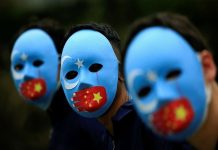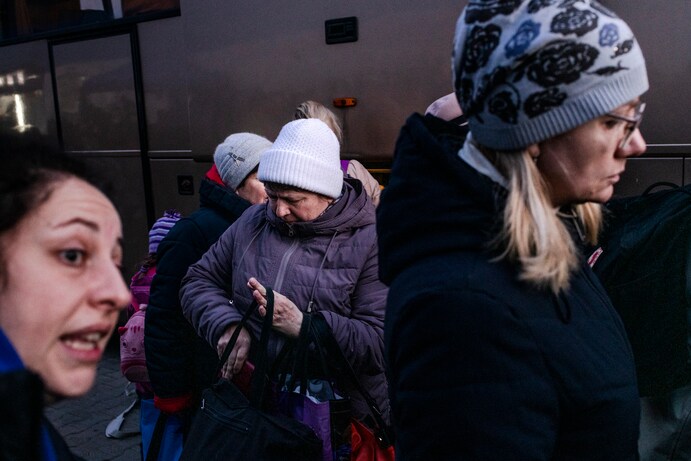KYIV, Ukraine — Since the beginning of Russia’s full-scale invasion, Poland has been among Ukraine’s staunchest supporters, providing military and economic aid, taking in millions of Ukrainian refugees, championing Kyiv’s position in international forums and transforming its territory into the main conduit for Western arms shipments bound for the front lines.
But even among the closest of friends, serious quarrels can arise.
Last week, Polish and Ukrainian officials clashed openly, after Marcin Przydacz, a foreign policy adviser to Polish President Andrzej Duda, said that Ukraine should “start appreciating the role that Poland has played for Ukraine in recent months and years.” His remarks were in response to a growing dispute between Kyiv and Warsaw over Ukrainian grain exports into Poland, in which Ukrainian Prime Minister Denys Shmyhal had called Poland’s actions “unfriendly and populist.”
Under a deal brokered by the European Union, Poland and four other neighboring countries are allowed to ban Ukrainian grain imports to protect their domestic farmers, but allow the grain to cross their territory into other countries. The agreement is set to expire on Sept. 15, but Przydacz and other Polish officials have called for extending the restrictions.
“Ukraine really got a lot of support from Poland,” Przydacz said in an interview with Polish radio in late July. “What is most important today is defending the interest of the Polish farmer.”
Grain sales are an acute, if not existential, issue for Kyiv after Russia stepped up bombing of Ukraine’s Black Sea ports last month, cutting the main export routes to global markets.
Ukraine’s foreign ministry summoned Polish Ambassador Bartosz Cichocki for discussions last Monday, after Przydacz’s comments. The following day, Polish officials called in Ukraine’s ambassador Vasyl Zvarych for a similar talk.
Relations with Ukraine at the moment are “not the best,” Polish Deputy Foreign Minister Pawel Jablonski told Polish radio. Ukraine “should not attack its allies,” he added.
Przydacz’s comments, and the subsequent back-and-forth between the capitals, do not seem to pose a threat to Ukraine’s close relations with Poland, which date back to the start of Ukraine’s independence.
But the dispute also underlined the balancing act that Ukraine faces in trying to square its own pressing needs with those of its neighbors and supporters — allies on whom Kyiv now depends for its very existence — while also trying to minimize any differences of opinion that Moscow could exploit.
The tension also points to exhaustion and frayed nerves as the Russian invasion nears its 18th month, leaving some observers anxious.
“I am worried about this because, you know, the history is not given, it’s not predetermined,” Tymofiy Mylovanov, head of the Kyiv School of Economics, said. “Actions of individuals, especially political leaders, matter — matter a lot,” he said. “And I think mistakes could be made, and if mistakes are made, there would be a rift between Poland and Ukraine.”
So far, Ukrainian President Volodymyr Zelensky and top Polish officials have managed to stifle any flash points between their countries, including an incident last year when a stray Ukrainian antiaircraft missile apparently landed in Poland killing two Polish citizens.
In response to the grain dispute, Zelensky, writing on the social media formerly known as Twitter, said that “political moments” should not spoil relations between the two countries and “emotions should definitely cool down.”
He also stressed that Ukraine greatly appreciated “the historical support of Poland, which together with us has become a real shield of Europe.”
“And there cannot be a single crack in this shield,” he added.
But there is the potential for a few cracks, given that Poland once controlled large portions of Ukraine, and the two countries share a complicated and sometimes bitter history.
In July, Zelensky and Duda marked the 80th anniversary of events during World War II, in which members of Ukrainian insurgent units, fighting to establish an independent Ukrainian state, launched a series of brutal attacks on Polish villages in the Volyn region, now in western Ukraine, killing tens of thousands.
Zelensky joined Duda for a religious ceremony in the western Ukrainian city of Lutsk to commemorate the events — a gesture of reconciliation that was highly appreciated by Polish officials.
Nonetheless, popular narratives in Poland and Ukraine still differ greatly about what transpired 80 years ago.
Poles call what happened the “Volyn massacre” and say it was part of a larger effort by Ukrainian forces to ethnically cleanse Poles from the region. Ukrainian nationalists say the events were the result of an ongoing struggle between Poles and Ukrainians at the time.
Duda and Zelensky jointly tweeted they were honoring “all innocent victims” of Volyn. But in a potential reflection of the divide between their countries, Duda wrote in a separate tweet that he had joined Zelensky to “pay tribute to murdered Poles.”
The Volyn events are significant to a small but vocal minority of nationalist and far-right groups in Poland. Ukrainian news outlets reported in July that fans at a soccer match in the Polish city of Wroclaw unfurled banners saying “Ukrainians murdered children in Volyn” and “80 years of shameful silence for Volyn.”
“There are two sensitive issues between Poland and Ukraine, the first is history and it’s been an old problem for years,” said Wojciech Kononczuk, director of the Polish-government funded Centre for Eastern Studies. “The other problematic point is the question of this Ukrainian grain.”
With farmers a major voting base for Poland’s governing Law and Justice party, the grain issue has been particularly contentious for the Polish government which faces elections this fall.
The far-right Confederation party has also mounted a campaign against what they describe as the “Ukrainization of Poland.” Poll numbers suggest that the far-right party could end up acting as kingmaker after the mid-October elections, raising concerns that its members could seek to reduce Poland’s support for Kyiv.
Kononczuk said there have been “some emotional steps and decisions” by Ukrainian and Polish officials.
He said the summoning of the Polish ambassador in Kyiv to the Ukrainian foreign ministry was met with surprise in Warsaw, especially as Cichocki is among a handful of ambassadors who remained in Kyiv during the Russian siege and has been one of Ukraine’s strongest diplomatic backers.
But “sympathies between Poles and Ukrainians are at an unprecedented level,” Kononczuk said, helped by “common perception of the security threats” posed by Russia.
Still, the grain dispute is not going away.
Ukraine’s agriculture minister, Mykola Solskyi, insists that restrictions on Ukrainian imports into neighboring countries must be lifted as soon as possible.
“What will be the consequences if [Ukrainian farmers] do not survive this year?” Solskyi asked in an interview. This was “an extraordinary situation, even during an election period,” he said.
The European Union loosened regulations on Ukrainian farm exports at the beginning of Russia’s invasion, to help the Ukrainian economy, in which agriculture is a major sector. Grain exports to Ukraine’s neighbors surged.
However, in response to the jump in imports, as well as a drop in grain prices worldwide, the European Union in May permitted Poland, Bulgaria, Hungary, Romania and Slovakia to block domestic sales of Ukrainian wheat, maize, rapeseed and sunflower seeds, while allowing them to transit to other countries. However, for Ukraine producers, exporting by land further than to neighboring countries within the European Union sharply increases transportation costs.
Solskyi said he believed that Russia’s recent decision to abandon a United Nations-brokered deal that allowed grain shipments from Black Sea ports was triggered by the decision to restrict Ukrainian exports in neighboring countries, which gave the Kremlin a pressure point to use to squeeze the Ukrainian economy.
“We all understand that it is most profitable for us to go by sea and the most convenient for our neighbors,” he said. “But our neighbors should understand that the first step for us to travel by sea is to lift their bans.”
Still, Solskyi said he was not worried about the tensions that the dispute has created with Poland as “there are no real friends and real partners without discussion.”
“Take my best friends,” he said. “If we don’t argue once every two or three months, then something is missing.”

































